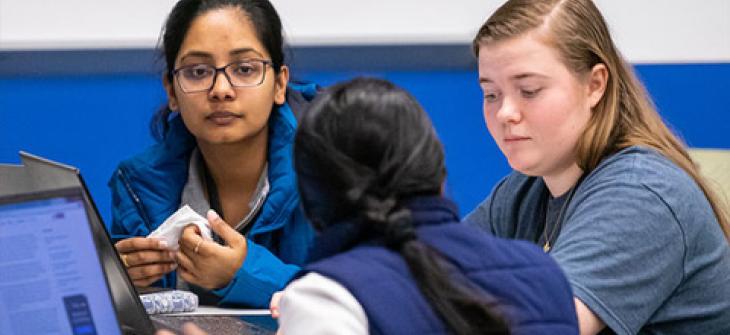New Health and Life Sciences Concentration for Informatics Major
Content

The Robert and Donna Manning College of Information and Computer Sciences (CICS) is expanding its undergraduate informatics major with a new concentration in Health and Life Sciences (HLS), and is currently accepting applications from current and prospective students for the program.
Informatics majors at CICS study the design, application, use, and impact of computational principles and technology with the goal of applying that knowledge to another domain of interest, such as art, social sciences, journalism, business, life sciences, and public health. HLS becomes the second concentration for the informatics program, joining Data Science as a concentration option for students majoring in informatics.
The launch of the HLS concentration at CICS recognizes the myriad ways in which computing is revolutionizing health and life sciences, including predicting the spread of diseases, unraveling the genetic basis of disease with computational genomics, and creating new opportunities for improved and personalized health with sensors. It also represents a response to significant demand for such a concentration from current informatics majors, a cohort of students representing a widely diverse set of backgrounds and academic interests.
"The program is unique in teaching students to apply the computational lens across the full spectrum of interconnected areas that impact human health and well-being," says Ramesh Sitaraman, informatics program director and professor at CICS. HLS will have four core areas of study: public health informatics, where computation and data are key to understanding the spread of diseases and improving public health outcomes; bioinformatics, the computational science of modeling and analyzing biological systems including genes and RNA/DNA; clinical health informatics, which focuses on the use of information technology in health systems, such as the visualization of health data or electronic health records or claims data; and personal health informatics, including mobile health (mHealth), which uses sensing and mobile devices to provide individualized healthcare.
The college is especially encouraging applications from students with an interest in biology, public health, or personalized health care. “For example, with COVID, we’ve seen an increased importance in the ability to quickly and accurately extract and display data in ways that are meaningful and informative to the public as well as health officials. This concentration would be a great match for students who are interested in pursuing that sort of work, or in fields with similar real-world challenges that don’t hold to hard-and-fast disciplinary boundaries,” says Michelle Trim, associate director of the informatics program and senior teaching faculty at CICS.
The concentration is also recommended for students who are pre-med or interested in double majors in areas including biostatistics, biology, or public health. “Informatics can be a destination by itself but it can also be a way to augment a student’s commitment in a particular domain area,” explains Trim. “Students in this program are showing us a real entrepreneurial spirit where they decide what skills they want to manifest in the workplace, and what kind of job they want to pursue.”
The program builds on existing strengths of both UMass Amherst and the Commonwealth of Massachusetts in the field of health care and public health. Massachusetts is widely considered a top destination for employers in the field, with significant employment potential for graduates in the area. At UMass Amherst, the concentration was developed in collaboration with faculty from the School of Public Health and Health Sciences (SPHHS), College of Natural Sciences (CNS), UMass Chan Medical School, and the Institute for Applied Life Sciences (IALS).
HLS also draws on significant expertise from within CICS in using sensing and artificial intelligence to provide individualized health care, including wearable health sensors, flu forecasting, and mobile health solutions for strokes, Parkinson's disease, traumatic brain injuries, and osteoarthritis. CICS faculty are also on the forefront of using artificial intelligence in the in-home health care of older adults, with the college hosting a new $20 million center on artificial intelligence, aging, and Alzheimer’s funded by a grant from the National Institute on Aging.
HLS will feature an innovative curriculum, including a new course on clinical health informatics taught by Assistant Professor Sunghoon Ivan Lee, in collaboration with faculty at the UMass Chan Medical School, and with the assistance of a UMass Lilly Teaching Fellowship. In addition to this new course, HLS students will have the opportunity to take classes in bioinformatics from CNS, in statistical modeling of health data from SPHHS, and mobile health sensing and analytics from CICS. All students will take one course with a significant ethics component, with available options that include medical ethics, research ethics, or ethical considerations in computer science.
“Students who graduate with this portfolio of knowledge have an amazing opportunity to help solve the major healthcare and wellness challenges of our time,” says Sitaraman. “Their proficiency in computational thinking and their interdisciplinary education will help them bring fresh perspectives and new solutions to the field in our increasingly interconnected world."
Current UMass Amherst undergraduate students who apply by December 10 will be considered for the Spring 2022 semester admissions to the major. Prospective students are encouraged to choose Informatics as their preferred major when applying to the university for Fall 2022 admittance. Learn more about the informatics major at CICS and how to join the major.